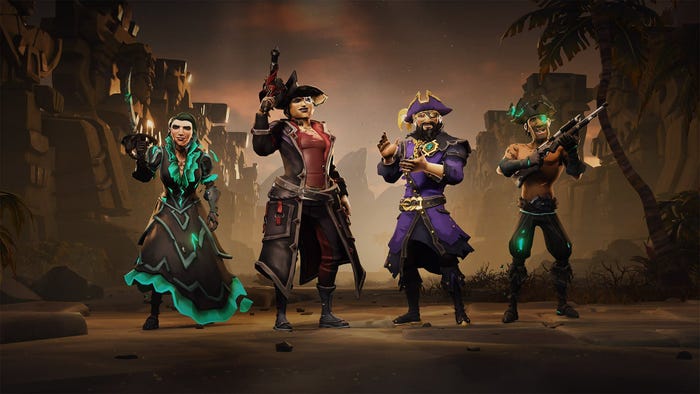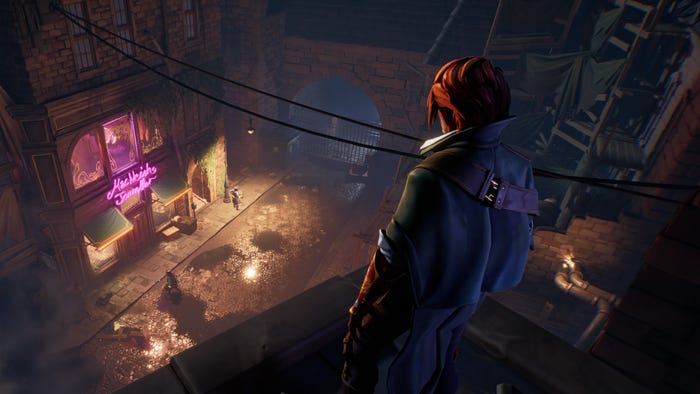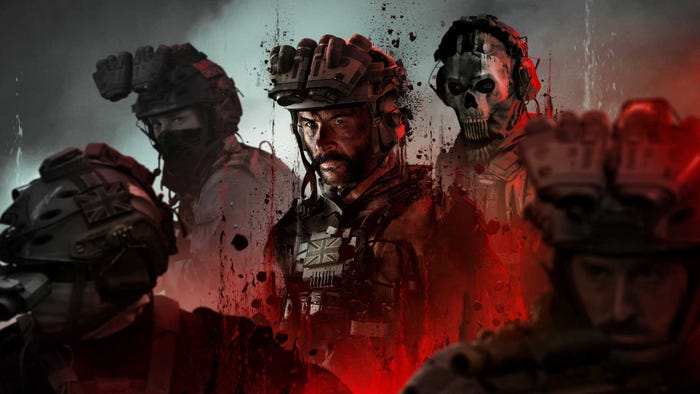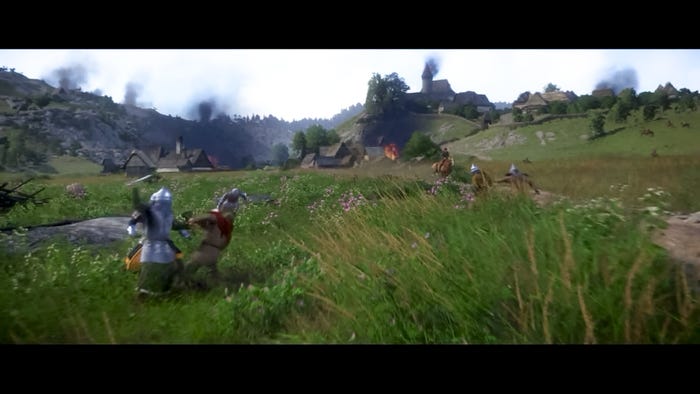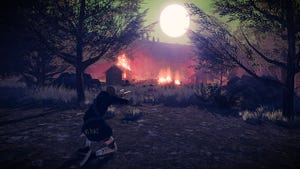
Featured Blog | This community-written post highlights the best of what the game industry has to offer. Read more like it on the Game Developer Blogs.
There's been an ongoing discussion about whether or not Telltale Games makes, well, games. Recently I was thinking about that and figured I might as well step into the minefield and tell the world what I think. So, does Telltale make games? Flame on.

This is my first blog post on Gamasutra. Everything I post here will be on my own blog, too: https://warrenspector.wordpress.com/. But, my own blog will feature additional items that interest me but aren't necessarily Gamasutra-worthy. (I promise all my posts won't be about the Denius-Sams Gaming Academy, my current and nearly all-consuming gig.) So, if you're interested, keep an eye on this and my personal blog, okay?
Enough prologue, let's get to blogging.
I wanted to start my Gamasutra blogging career with something that's been on my mind for a while (since GDC, for sure, and long before that, truth be told). What prompted me to write this, in particular, was an email I got the other day from an Australian journalist -- Patrick Stafford -- about something that happened at GDC 2015. Here’s the portion of his email that led me to this post:
"At GDC, I was at a panel about Telltale’s games – a bunch of their writers were speaking. At one point, Kevin Bruner asked the audience something along the lines of, 'does anyone here think that what we make shouldn’t be called games?' I looked around, and I believe I saw you raise your hand."
Truth be told, the guy was right. I did raise my hand in answer to Kevin’s question, and I have to own up to the fact that I was expressing a sincerely held belief. I’ve often said Telltale makes things that are game-like, but not exactly games. I think of them as some sort of interactive experience (obviously), but does that mean “game?” I don’t think so.
Now, before people get their shorts in a knot about this, let me say a couple of things:
First, the definition of “game” is so broad (and ill-defined... and debated...), Telltale’s work can clearly be said to fall under that umbrella, if you want to put it there. And if you do want to put The Walking Dead, The Wolf Among Us, Tales from the Borderlands, Game of Thrones and others in the "game" category (or, to cite a non-Telltale example, David Cage's Heavy Rain), go ahead. I'm not religious about this. Labels, at the end of the day, aren’t all that important, you know? Understanding how something works is important, but labels, not so much.
Second, I love Telltale’s work. The fact that I think of The Walking Dead et al as wonderful experiences but not wonderful games may seem like a subtle distinction, but it’s an important one for me.
So, circling back to Patrick's email, I figured I owed him a response and, at the same time, thought this was a good opportunity to think through - for myself - my feelings about Telltale's work. So let's tiptoe through the minefield...
When I think of games – narrative games -- I think of several things: plot (of course), but also challenges, goals and solutions. I think of character progression. Unlike, say, David Cage, I think of systems and mechanics - I think a lot about that. I think of players having some impact on the narrative or, at least, how that narrative plays out minute-to-minute (given each player's unique skills and the choices each makes in overcoming developer-created problems).
That last one is the most important to me, personally, something to bear in mind here. Nothing else (literally nothing) is more important to me. Your mileage may vary.
I'm absolutely not saying that all games should or must empower players, giving them ownership of the narrative at the minute-to-minute level. However, if you accept that idea, even simple choices can make a difference. You don’t have to go full-on Mass Effect or, if you’ll indulge me, Deus Ex. It’s fine to empower players in small and/or conventional ways:
Which weapon do I use to defeat an enemy? A perfectly reasonable, if minor experience differentiator.
Do I go up here before going down there? Again, giving players even this amount of freedom is a small win.
Do I wait for a long straight piece to fill in a narrow gap or do I drop the L-shaped piece that's already on the screen? Even Tetris tells a player-recounted story, of a sort.
You can probably think of dozens, hundreds, thousands more of these small differentiating elements, from games that most people wouldn’t think are particularly player-empowering. The ones I’ve listed, and the others you can think of, may be the lamest choices imaginable (though I’m not saying they are). Lame or not, each of these player-driven decisions significantly differentiates one player’s experience from another.
(As a note, the test of whether a choice has made a meaningful difference is whether two players, discussing their experience, describe a unique moment, even if the outcome of a choice is the same for both of them.)
For me, differentiated experience is a defining characteristic of games - maybe the defining characteristic.
By contrast, Telltale’s work, though incorporating a kind of player-empowerment, limits player options in significant ways.
Let’s go back to the list of things I think of when I think about game narrative - challenges, goals, solutions, mechanics/systems and character progression.
If you’ve experienced any of Telltale’s work you’re probably way ahead of me, but here’s my take:
Games like The Walking Dead certainly offer story, challenges, goals and solutions. Isn’t that enough to call them games and put all this seemingly nit-picky labeling behind us? Obviously, I don’t think so or I’d just stop right here and say “Oops. Never mind.” So what is it about Telltale’s work that makes it hard for me to say they’re games?
For starters, they basically have no mechanics (or when they do introduce simple mechanics — shooting while backing up stairs and such -- they seem out of place and unnecessary). There's no character progression to speak of. And there's no real player control of the minute-to-minute. That last point is key.
Everything Telltale offers is pre-planned -- even the game-like qualities they do incorporate. The challenges, the goals the solutions, everything is determined and constrained by the designers through a script that I'm pretty certain utilizes a traditional branching tree structure. (True confession time: I don’t have any inside information about how things work under the hood at Telltale -- I’d love it if someone who did know would chime in and tell me!)
If my experience of Telltale’s work has led me to the correct conclusion, you can’t really go where you want to go when you want to go there and I don't think there’s ever the possibility of a player discovering a freeform, player-driven solution to a problem.
What that tells me is that Telltale is less interested in empowering players and, like a novelist or film-maker, more interested in the story they want to tell. It tells me they’re not much interested in the player’s impact on the minute-to-minute unfolding of the experience. Nothing wrong with that, though it's not a choice I'd likely make as a developer. What Telltale clearly does care about is character interaction and dialogue choices that give the illusion that players have a role in directing the narrative. And they clearly value choices that feel meaningful (even when they’re really not). Man, does Telltale get choices.
Paradoxically, these player-limiting characteristics and the focus on linear story elements are, I think, where the Telltale magic happens.
Magic? You bet. The magic is that the choices Telltale offers say little or nothing about the characters' feelings about a situation… and they’re not about allowing players to min-max or optimize or save-and-reload until they find the “best” solution to the puzzle or problem. Do you know how rare these characteristics are in games?
Pretty damn rare. The magic of Telltale’s choices - the magic of their work, overall, is that I, at least, and I suspect many of you reading this, forget the character you're playing. The choices Telltale asks you to make as you wend your way through their artfully crafted stories reveal something about the player’s feelings about right and wrong. Telltale forces you to, within script constraints, think about what would be the best thing to do in a given situation if you encountered that situation in the real world (or a zombie-infested one...). "Game space" is subordinate to "real space" and character development is subordinate to players' realizations about themselves.
Despite featuring strong, well-developed characters, Telltale’s scripts force players to think for themselves and about themselves. That's awesome and, if I may say, what I've always tried to do in the games I've worked on. I'll let others decide how successful I've been. Clearly, Telltale's approach is working.
Telltale succeeds at this not because their mechanics are great or their puzzles are challenging or their worlds are open-ended. They succeed because their scripts are flat-out better than other people's, and even more important, those scripts pose ethical dilemmas that are more subtle and problematic than anything anyone else in the game business has on offer.
Is there more to the magic than talented writers and an interest in ethics? I think there is. Again, I have no inside information, but I think there's a structural thing going on that's pretty old-school but still very effective: I’ve already mentioned the branching tree structure. Telltale’s work takes that to a whole new level. Without meaning to disparage anything or anyone in any way, I often describe the Telltale (or David Cage) approach as jamming several movie scripts together and, then, refining those scripts so they intertwine with one another to give the illusion of player choice, rather than the reality of it.
That has some interesting side effects that make it hard for me to apply the word "game":
No matter how convincing the illusion is, I’m pretty sure no one at Telltale has ever been or will ever be surprised by any choice any player makes. Millions of players can play, but because writers and designers carefully craft every choice ahead of time, the possible outcomes all exist, in some metaphysical sense, in "script-space," regardless of which choices you select.
And no player will ever surprise themselves as they play because they really have very little freedom, if any, to leave the tracks laid by the intertwined scripts. Players will be surprised by the choices and consequences afforded them by the talented, creative people whose scripts they're experiencing, but nothing can happen unless a writer/designer implemented it in the first place. Being surprised by something - largely a result of interactions between tools/interactions with in-gameworld elements - requires giving players control at a level Telltale simply won't allow.
That means that the only difference between my experience and yours in a Telltale game is that I chose one script and you chose another. You saw a slightly different scene than I did but, ultimately, your script and my script will converge again, maybe even in the very next scene. In reality, we’re both experiencing a single story, just a well-disguised one. We can compare our choices with other people's choices - something Telltale exploits in an exceptionally elegant and compelling manner -- and the results seem player-driven because branching done in a sophisticated manner works that way. But that comparison of my pre-planned choices versus your preplanned choices is all players can do. They can't really make a difference. It's cool that you made the same choices as 42% of players, but that doesn't add up to a game-defining, player-driven narrative in my book.
That it works at all is part magic trick and part something else (which I'll get to in a moment - remember the words "familiarity" and "comfort"). And, just to restate in a slightly different way something I said earlier: I don't believe Telltale's magic tricks make their work "less than" or "worse than" other interactive narratives or works more irrefutably classified as games - far from it. Magic is cool - cool enough that The Walking Dead was my favorite interactive experience of 2012 and Telltale's more recent work is compelling as well.
Going one step further, I'm so inspired by Telltale's work that I actually thought about trying to make a game in that style. I’m sure it’s a lot harder than it looks, but I suspect it would be like writing a choose-your-own-adventure book (with pretty pictures). I wrote some pick-a-path stuff back in my tabletop days and had a lot of fun with it so, yeah, I've thought about exercising that muscle again...
Anyway, let me give you a sort of a bottom line (“sort of” because I’m not really done yet - this is just an illusion of closure...).
If you need to put a label on what Telltale does, here's my answer: No, they're not making games. They are, as I hinted earlier, making "experiences" (my preferred, if imprecise term). To be more concrete, and at risk of being mocked for resurrecting a term long thought dead, let's say Telltale is the place that finally cracked the “interactive movie” code. Terminology aside (and my embarrassment at using it), for those of you who've been sleeping under a rock for the last 25 years, the true interactive movie has been the holy grail for a lot of developers and, now we know, the experience of choice for a lot of players. And Telltale's better at it than anyone else.
I know there's no great insight in trotting out the hoary old chestnut: "interactive movie." (I fully expect a fair amount of grief about even typing those words from the deeper thinkers among you.) But I think an accurate hoary old chestnut is better than lumping Telltale’s work in with clearly categorizable narrative games that function in fundamentally different ways and offer players fundamentally different kinds of experiences.
One final semi-relevant thought (and now I really am wrapping up): A large part of Telltale's success probably stems from the familiarity normal people - i.e., non-gamers - have with existing media like movies and television. People get movies and TV and, therefore, have a high level of comfort with a work that looks like a movie or TV show and feels like a movie or TV show - but one that can be redirected in simple, safe yet still compelling ways by the viewer. A lot of developers - I’ll include myself here - would be well-served by focusing a little more on familiarity and the comfort of our audience. Going to them rather than insisting they come to us makes a lot of sense, something Telltale gets (and I do not...).
So does Telltale make "games" or "experiences" or "interactive movies?" Honestly, despite having just spent pages making some sort of case, I really don't much care what you call them. Call them poodles for all I care. As long as Telltale keeps doing what they do as well as they do it, I'll be a happy guy.
BTW, I was going to end this post with something along the lines of "If you want to comment on this, I'm eager to engage in a dialogue about Telltale, games and narrative. However, I beg you to refrain from using the terms 'narratology' or 'ludology.' Those words make my skin crawl. I'll probably ignore any comments that go there." I was going to do that, but thought it might be too obnoxious, so I didn't. Well, now that I think about it, I just did end my post with that comment (foolishly, no doubt). First mine, triggered, I guess. Have at me.
I’m done now. Got to go play some Game of Thrones...
Read more about:
Featured BlogsAbout the Author(s)
You May Also Like



